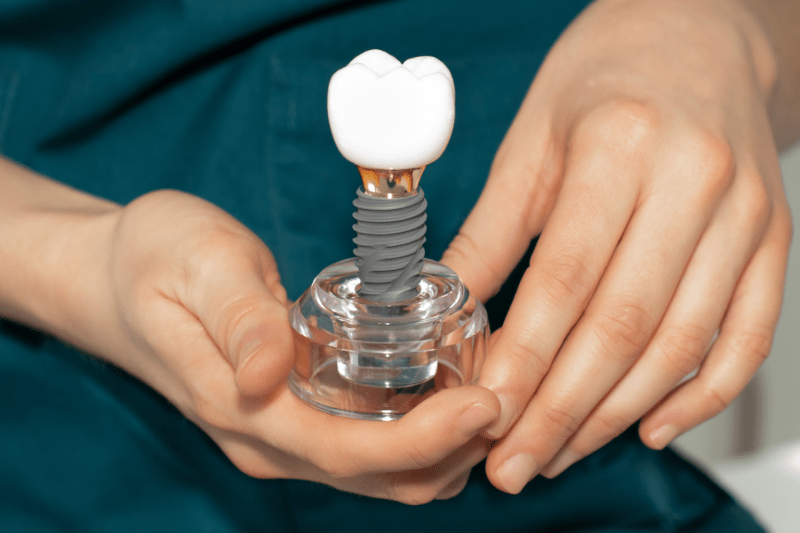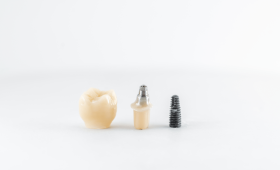What is a Dental Crown and In What Cases Is It Used?
A dental crown, commonly known as a porcelain crown, is an artificial “cap” or “cover” placed over a damaged, weakened, or broken tooth. It wraps around the entire surface of the tooth to restore its original shape, size, strength, and appearance.
This treatment is used especially in cases where a large part of the tooth has been lost due to a large cavity, to protect teeth that have undergone root canal treatment and are at risk of fracture, or to correct the color or shape of the tooth for aesthetic reasons. Crowns prevent further damage to the tooth, ensure the continuity of chewing function, and improve overall oral health. At the same time, they also act as a supportive component of a dental bridge or implant treatment.
When Does Getting a Dental Crown Become Necessary?
Getting a dental crown usually becomes necessary when the tooth is too damaged to be saved. If a tooth is too decayed to be repaired with a large filling, or if it is cracked or broken, a crown is the most effective solution.
After a root canal treatment, the tooth structure is weakened, increasing the risk of fracture; in this case, a crown is vital for protecting the tooth. From an aesthetic perspective, in cases of severe discoloration, misshapen teeth, or large gaps between teeth, a crown can be preferred to achieve the desired smile. Your dentist will evaluate the current condition of your tooth in detail to decide whether a crown is necessary.
What Are The Alternatives to Dental Crowns?
There are various alternative treatment methods to a dental crown, and the most suitable one is determined based on the tooth’s current condition, the extent of the damage, and the patient’s expectations. The most common alternatives include fillings, porcelain onlays/inlays, implants, dental bridges, and porcelain veneers.
Each method has its unique advantages and disadvantages. For example, a filling may be sufficient for a small cavity in the tooth, while an onlay or inlay may be preferred for more extensive damage. For missing teeth, an implant or bridge treatment can be considered. If aesthetic concerns are a priority, a less invasive method like a veneer may be suitable.
Can a Filling Treatment Replace a Dental Crown?
A filling treatment can only replace a dental crown for small to medium-sized cavities or damage. A filling restores the tooth by cleaning the damaged part and filling the gap. However, in cases where a large portion of the tooth’s structure is lost, the risk of fracture is high, or there are serious aesthetic problems, a filling is insufficient. Filling materials are not as strong as dental crowns and cannot provide as good protection against chewing pressure. Therefore, your dentist will evaluate the extent of the damage and the durability of your tooth to decide on the most appropriate treatment method.
What Are Onlays and Inlays and How Do They Differ From Dental Crowns?
Onlays and inlays are more conservative and minimally invasive alternatives to dental crowns. An inlay is a type of filling made to restore the area between the cusps on the chewing surface of the tooth, while an onlay covers one or more of these cusps. Both procedures are custom-made in a dental lab. While a dental crown covers the entire tooth, onlays and inlays only restore the damaged area. This way, healthy tooth structure is preserved. They are a stronger option than a filling and less invasive than a crown. These methods are preferred when the tooth structure is largely intact but the damage is too large to be treated with a standard filling.
When Is Implant Treatment an Alternative to a Dental Crown?
Implant treatment typically emerges as an alternative to a dental crown in cases where a single tooth is completely missing. An implant is an artificial tooth root surgically placed into the jawbone, and a crown is attached to it. It is not possible to make a crown to replace a missing tooth in dental crown treatment, but the crown completes its function by being placed on an implant. The biggest advantage of an implant is that it does not harm the neighboring teeth and provides a feeling like a natural root. However, implant treatment is a longer, more invasive, and generally more expensive process.
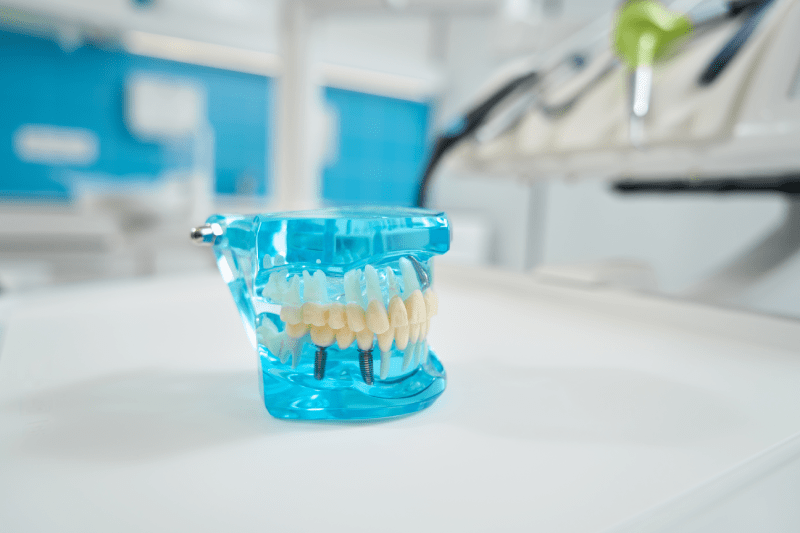
Is a Dental Bridge Treatment an Alternative to a Crown?
A dental bridge is a treatment method used to replace one or more missing teeth. Unlike a dental crown, a bridge fills the gap of a missing tooth. A dental bridge is made by placing crowns on the healthy teeth on both sides of the missing tooth gap and fixing an artificial tooth (pontic) between these crowns. A dental crown restores a single damaged tooth, while a bridge is used to compensate for the absence of one or more teeth. Therefore, crowns and bridges are treatments designed for different situations but can complement each other.
In What Cases Are Porcelain Veneers an Alternative to Crowns?
Porcelain veneers, unlike dental crowns, are very thin porcelain layers applied only to the front surface of the tooth. This method is ideal for solving only the aesthetic problems of the tooth. It is used in cases of slight discoloration, small fractures, cracks, or to close gaps between teeth. Unlike a dental crown, there is no need to cut the entire tooth; only a very thin layer is removed from the front surface, or it can be applied without any abrasion. Porcelain veneers are an excellent aesthetic alternative for patients looking for a minimally invasive method.
Can Bonding (Aesthetic Composite Filling) Treatment Replace a Crown?
Bonding is a faster, more cost-effective, and less invasive aesthetic treatment method compared to a dental crown. In this technique, a special composite resin material is directly applied to the tooth, shaped, and hardened. Bonding is ideal for repairing small fractures, closing gaps between teeth, or correcting slight discoloration. However, bonding material is not as durable as a porcelain crown and can stain or wear down over time. If there is significant damage to the tooth’s structure, a crown offers a more durable and long-lasting solution.
What Are The Most Important Advantages of a Dental Crown?
One of the most important advantages of a dental crown is its durability and longevity. A properly placed and maintained crown can be used for many years without any problems. Crowns protect the tooth from external factors, minimizing the risk of fracture or decay. They also provide excellent aesthetic results. Especially porcelain and zirconia crowns offer a look that is very similar to natural teeth. Functionally, they also contribute to oral health by balancing chewing forces.
What Are The Potential Disadvantages of Dental Crown Treatment?
The biggest disadvantage of a dental crown is that a certain amount of healthy tooth tissue needs to be ground down or cut for its application. This is an irreversible procedure. The cost of a crown is higher than other methods like fillings or bonding. Additionally, if the crown is not made correctly, bacteria can leak from its edges, which can lead to decay of the underlying tooth. Therefore, choosing the right dentist is very important. Rarely, some patients may experience hot and cold sensitivity after the crown procedure.
Does Getting a Dental Crown Have an Age Restriction?
There is no strict age limit for dental crown treatment, but it is generally applied to individuals whose tooth development is complete. In young patients whose development is still ongoing, less invasive methods like fillings or bonding may be preferred over a crown. This is because cutting the tooth for a crown can damage the tooth’s nerve or lead to problems in the future. In elderly patients, suitability for crown treatment is decided after evaluating their general health and jawbone structure.
What Pains Are Normal After a Dental Crown?
It is quite normal to experience a slight pain or sensitivity after a dental crown application. This is due to the tooth undergoing a procedure and adapting to the new crown. You may feel sensitivity, especially when chewing or consuming hot/cold foods and drinks. This sensitivity usually subsides on its own within a few days and disappears completely. If the pain is severe or lasts for more than a week, it may indicate a problem with the crown’s height or another issue with the underlying tooth.
How Safe is a Temporary Crown?
A temporary crown is used to protect your tooth and provide an aesthetic look while your permanent crown is being prepared in the lab. Since it is not as strongly fixed as a permanent adhesive, you should avoid very hard or sticky foods. The purpose of a temporary crown is to protect the sensitive tooth tissue and help you maintain your chewing function. It is important to contact your dentist immediately if it comes off.
What Should I Pay Attention to After a Dental Crown?
In the first few days after a dental crown is placed, you may experience sensitivity and an adjustment period. It may be helpful to avoid very hard or sticky foods during this period. Most importantly, to ensure the longevity of your crown, you should pay extra attention to your oral hygiene. You should brush your teeth at least twice a day, use dental floss, and clean the areas under the crown with interdental brushes recommended by your dentist. Regular dental check-ups are also necessary for the early detection of potential problems.
What is The Lifespan of a Dental Crown?
The lifespan of a dental crown depends on the quality of the material used, the patient’s oral hygiene habits, and regular dental check-ups. On average, a dental crown can last between 10 to 15 years. However, a well-cared-for crown made with high-quality materials can last for more than 20 years. Habits like teeth grinding or biting on hard objects can shorten the lifespan of the crown.
How is a Dental Crown Maintained?
Maintaining a dental crown is no different from maintaining your natural teeth. You should brush your teeth at least twice a day, use dental floss, and rinse your mouth with a mouthwash. The area where the crown meets the gum line is a high-risk area for bacterial accumulation and needs to be cleaned well. Your dentist may recommend a special toothbrush or floss for cleaning this area.
Can a Cavity Form Under a Dental Crown?
Yes, the tooth under a dental crown can decay if the crown does not fit perfectly or if oral hygiene is insufficient. Bacteria and food particles that leak from the edges of the crown can cause the underlying tooth to decay. Therefore, it is very important that the edges of the crown fit the tooth perfectly and that oral hygiene is maintained at the highest level. Cavities under a crown usually manifest with pain or sensitivity.
Does Teeth Grinding Damage a Crown?
Yes, the habit of teeth grinding (bruxism) can cause serious damage to dental crowns. This habit applies excessive pressure on the crown, which can lead to cracking or breaking. The use of a night guard reduces this pressure, protecting both your crowns and your natural teeth. If you have a teeth grinding habit, it is of vital importance to discuss this with your dentist before or after getting a crown.
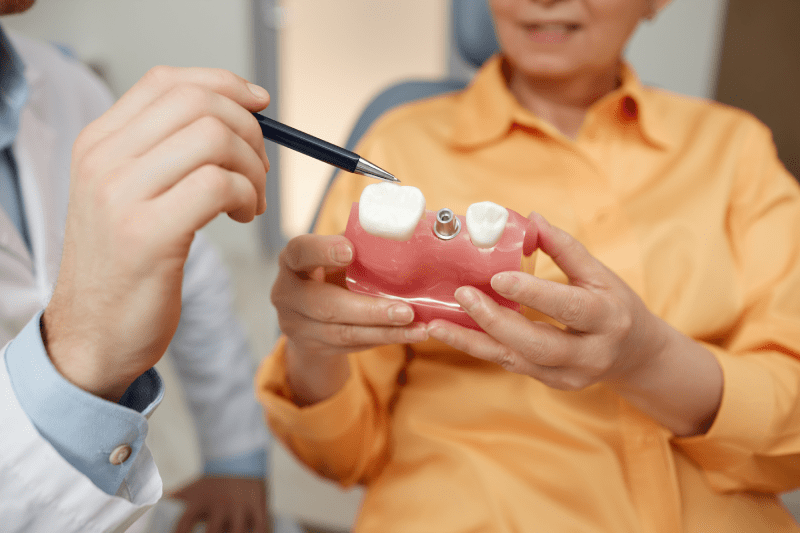
How Is a Crown Height Problem Solved?
The height of a dental crown can disrupt your chewing pattern when it is first placed. This can lead to pain or discomfort in the jaw joint. However, this problem can be easily solved by your dentist. Your dentist will check the height of the crown using a special tool and make the necessary adjustments. Within a few minutes, the crown is brought into alignment with your other teeth, and your chewing function returns to normal.
What Determines The Prices of Dental Crowns?
The prices of dental crowns largely depend on the type of material used (porcelain-fused-to-metal, zirconia, full porcelain), any required additional treatments (for example, root canal treatment), the number of crowns to be made, the dentist’s experience, and the geographical location of the clinic. For the most accurate price information, a dental examination is essential.
Why Should I Choose Turkey For Getting a Dental Crown?
Turkey is an internationally recognized destination for dental treatments, offering high-quality standards, modern technology, and experienced dentists. Treatments like dental crowns can be much more affordable than in Western countries, which makes treatment more accessible. Comfortable travel options and tourist-friendly services also make Turkey an attractive choice.
Do Dental Crowns Look Natural Aesthetically?
Modern dental crowns offer a very natural aesthetic appearance. Especially zirconia and full porcelain crowns, as they reflect light like natural teeth, provide perfect harmony in color and brightness. Your dentist will adjust the color and shape of your crown to match your neighboring teeth, achieving a look that prevents it from being noticed as artificial.
Do Dental Crowns Cause Bad Breath?
Poorly made or neglected dental crowns can cause bad breath. Food particles and bacterial plaque that accumulate at the edges or under the crown can produce gases that lead to bad breath. This can be prevented with good oral hygiene and regular dental check-ups.
Is a Color Difference Formed Between a Dental Crown and Other Teeth?
Yes, while the natural color of your teeth can change over time, the color of your dental crown remains constant. This can lead to a color difference between your other teeth and the crown. Therefore, if you are considering a procedure like teeth whitening, it is recommended to do it before your crown is made.
Which Methods For Dental Crowns Are Less Invasive?
The least invasive methods for dental crowns are porcelain onlays/inlays and porcelain veneers. In these methods, the preservation of healthy tooth tissue is prioritized, and only the areas that are damaged or need aesthetic correction are worked on. This helps preserve the long-term health of the tooth and results in less sensitivity.
Is Dental Crown Application Painful?
No, dental crown application is generally a painless procedure. Thanks to the local anesthetic applied before the procedure, you will not feel any pain during all stages, such as tooth preparation, impression taking, and crown placement. There may be a slight sensitivity after the procedure, but this is usually temporary.
What Foods Should I Avoid to Extend The Lifespan of a Dental Crown?
To extend the lifespan of your dental crown, you should avoid very hard and sticky foods. Foods like nuts, hard candies, ice, and caramel can cause your crown to break or crack. A balanced and healthy diet is always best for your oral health.
Can a Dental Crown Cause Jaw Joint Disorder?
If a dental crown is misaligned or disrupts the chewing pattern, it can lead to pain in the jaw joint. Especially if the crown is higher than normal, it can cause fatigue in the chewing muscles. To prevent this, your dentist carefully checks the height of the crown.
Is It Necessary to Use Medication After a Dental Crown?
For slight pain or sensitivity after a dental crown, you can use over-the-counter painkillers recommended by your dentist. These medications are usually sufficient. However, in cases of severe pain or signs of infection, you may need to use antibiotics prescribed by your dentist.
What Should I Do If I Have Other Questions About Dental Crowns?
For any questions you may have about dental crowns or their alternatives, Cure Holiday experts are always ready to assist you. You can contact Cure Holiday to get the most accurate information, create a personalized treatment plan, and clear up all your questions. We are here to create a personalized dental crown plan for you.
Why Should I Choose Cure Holiday?
Cure Holiday brings together modern technologies and expert dentists to offer you the best dental crown treatment. With its transparent pricing policy and personalized treatment plans, it makes your dental treatment experience in Turkey comfortable and reliable. You can choose Cure Holiday to have a healthy and aesthetic smile.
How Is The Most Suitable Dentist For Dental Crown Treatment Chosen?
Choosing the right dentist for a dental crown is of critical importance for the success of the treatment. You should choose a dentist who is experienced, has references, and uses modern technologies. It is also important that the dentist communicates with you, understands your expectations, and provides you with detailed information about the entire process. Cure Holiday works with expert dentists who meet these criteria.
What Factors Are Considered When Determining The Need For a Dental Crown?
When determining the need for a dental crown, many factors are considered, such as the current condition of the tooth, the extent of the damage, the position of the tooth, your overall oral health, and your aesthetic expectations. Your dentist evaluates these factors to recommend the most suitable treatment method for you.
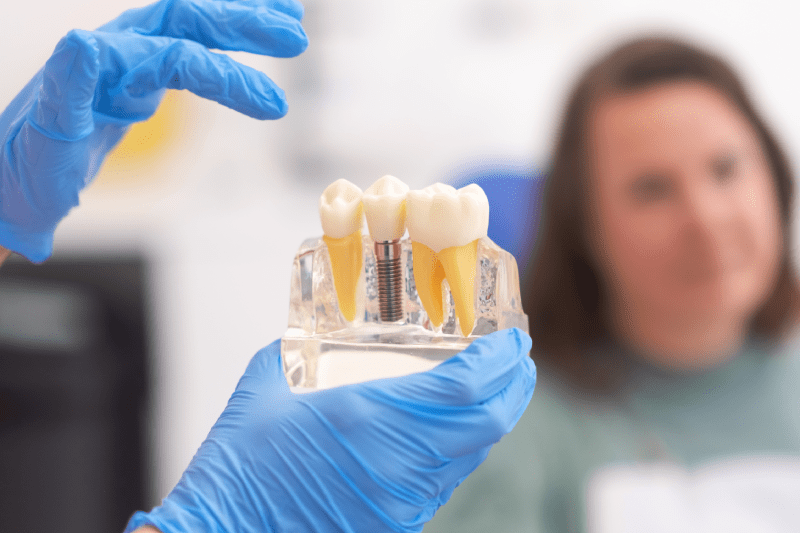
Are Check-ups Necessary After a Dental Crown Treatment?
Yes, regular check-ups after a dental crown treatment are very important. Your dentist checks the condition of the crown, the health of the underlying tooth, and your gum health. These check-ups ensure the early detection of possible problems and extend the lifespan of your crown.
How Does Dental Crown Treatment Affect My Gum Health in The Long Run?
A properly applied and well-maintained dental crown positively affects your gum health. However, if the crown does not fit correctly at the gum line, bacterial accumulation can increase in this area and lead to gum inflammation. This risk can be prevented with regular oral hygiene.
What Are The Main Differences Between a Dental Crown and a Filling?
The main difference between a dental crown and a filling is their area of application. A filling is used to repair small to medium-sized cavities, while a crown is used for teeth with extensive damage, a high risk of fracture, or teeth that have undergone root canal treatment. A crown has a stronger and more protective structure than a filling.
